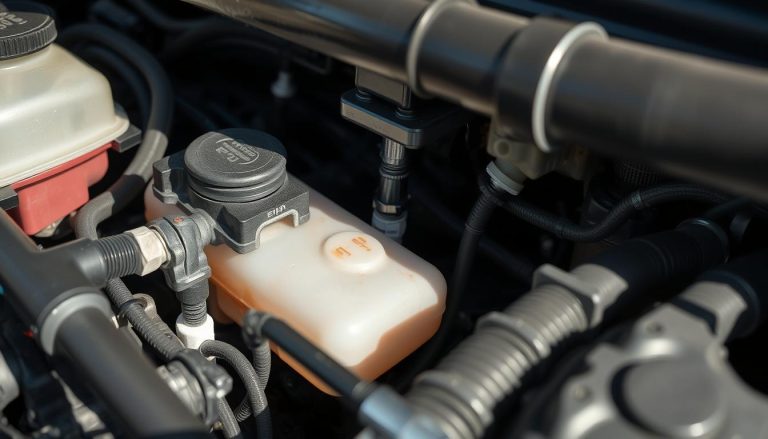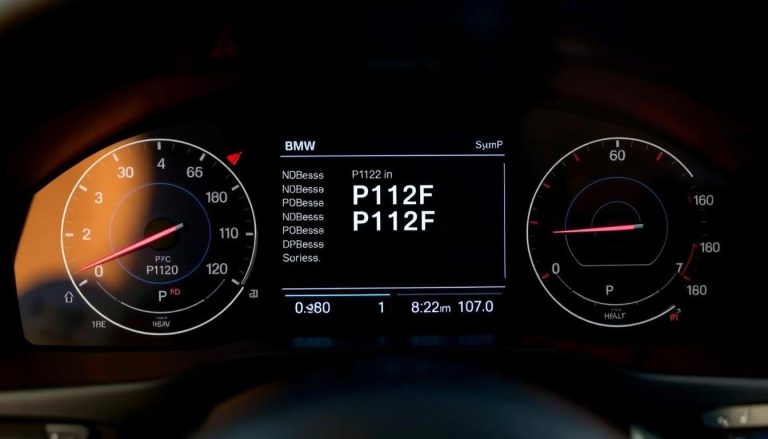When your check engine light flickers to life, one of the many codes that could trigger this ominous glow is the P0668 code, which points to an issue with the control module’s internal temperature sensor circuit.
Understanding this error can save you time and money while keeping your vehicle running smoothly.
If you’re curious about what causes this code, its symptoms, and how you can address it, you’re in the right place. Let’s dive into everything you need to know about the P0668 code!
What does the P0668 code mean?
The P0668 code indicates a problem with the control module’s internal temperature sensor circuit. Essentially, it means that the engine control unit (ECU) has detected an abnormal reading from its temperature sensor.
This sensor plays a crucial role in monitoring various components within your vehicle. It helps ensure everything operates at optimal temperatures, which is vital for performance and efficiency.
When the circuit reads lower than expected values, it sets off this trouble code. The ECU relies on accurate readings to make informed decisions about fuel injection and ignition timing.
A persistent P0668 code can lead to subpar engine performance, reduced fuel efficiency, and increased emissions. Addressing it promptly is essential for keeping your vehicle in peak condition.
What parts can be affected by P0668 code ?
When the P0668 code appears, it’s vital to understand which parts might be impacted. The control module itself is the primary component affected. This module relies on accurate temperature readings to function properly.
Additionally, wiring and connectors associated with the internal temperature sensor are at risk. Corrosion or damage in these areas can lead to erroneous signals being sent back to the control unit.
The engine management system may also experience issues due to this code. A malfunctioning control module can cause erratic performance from various sensors and actuators throughout your vehicle.
In some cases, related components like air intake sensors might show signs of distress as well. If one part fails, it often triggers a cascade effect impacting others in the system.
What are the possible causes of a P0668 code?
The P0668 code can arise from a variety of issues within your vehicle’s system :
- Faulty or damaged wiring
- Corroded or damaged connector
- Loose or defective control module ground strap
- Defective PCM, TCM or ECM
What are the common symptoms of a P0668 code?
When the P0668 code pops up, drivers may notice a few telling signs. One of the most common symptoms is an illuminated check engine light on the dashboard. This warning can vary in intensity but should always be taken seriously.
Another symptom could be erratic engine performance. You might experience rough idling or stalling, which can make driving feel unstable and uncomfortable.
Poor acceleration is also a red flag. If your vehicle struggles to pick up speed or feels sluggish, it’s worth investigating further.
In some cases, you may hear unusual noises coming from under the hood—especially if components related to temperature regulation are affected.
Decreased fuel efficiency often accompanies this code. If you’re suddenly visiting gas stations more frequently without changing your driving habits, that could signal an issue needing attention.
What are the diagnostic steps for a P0668 code?
When diagnosing a P0668 code, start with an OBD-II scanner. This tool will help you retrieve the trouble codes stored in your vehicle’s computer.
Next, visually inspect the wiring and connectors associated with the control module’s internal temperature sensor. Look for any signs of damage or corrosion that could affect performance.
After checking connections, test the temperature sensor itself using a multimeter. Verify that it provides accurate readings within specified ranges.
Clear the codes and take the car for a test drive to see if the P0668 code reappears. If it does, further investigation into related components may be necessary.
Consider using manufacturer-specific diagnostic procedures as well; these can provide additional insights tailored to your vehicle model.
How serious Is the P0668 Code? Can I continue driving with the P0668 code?
The P0668 code indicates a low reading from the control module’s internal temperature sensor. This issue may not seem urgent at first glance, but it can lead to more significant problems if left unattended.
Driving with this code active is generally not advisable. While your vehicle might still operate, performance issues could arise over time. You might notice decreased fuel efficiency or erratic engine behavior.
Ignoring the P0668 code puts your car at risk for potential damage. The control module relies on accurate temperature readings to function correctly, and any malfunction can compromise other systems.
If you’re experiencing this trouble code, it’s wise to have it assessed sooner rather than later. Addressing the root cause now can save you from costly repairs down the road.
What are the repair solutions for a P0668 – Control Module Internal Temperature Sensor Circuit Low ?
Repairing a P0668 code typically begins with thorough diagnostics. A mechanic will first inspect the wiring and connectors associated with the control module’s internal temperature sensor. Any signs of damage or corrosion must be addressed.
If the wiring seems intact, testing the sensor itself is crucial. Replacing a faulty temperature sensor often resolves the issue if it’s determined to be malfunctioning.
In some cases, software updates for your vehicle’s engine control unit (ECU) may fix glitches that trigger this code. Keeping your ECU updated can prevent future issues.
If these steps don’t resolve the error, deeper electrical problems might exist within the control module itself. In such scenarios, replacing or repairing the entire control module could become necessary to ensure proper functionality.
What other codes may be related to P0668?
When dealing with the P0668 code, it’s helpful to understand related trouble codes that might also pop up. These often indicate underlying issues within the vehicle’s control module and its temperature sensor systems.
Codes like P0606 may appear alongside P0668. This pertains to a malfunction in the PCM (Powertrain Control Module). It’s essential not to overlook this, as it could signal broader electronic problems.
P0685 is another relevant code you might encounter. It indicates an issue with the engine control module’s relay circuit, which can affect overall performance and diagnostics.
Don’t ignore any transmission-related codes such as P0700; they may shed light on communication errors between various modules impacted by temperature fluctuations. Understanding these connections can aid in more accurate troubleshooting and repairs.
How much does it cost to diagnose and repair a P0668 code?
The cost to diagnose a P0668 code can vary significantly based on the auto shop’s location and hourly labor rates. Typically, you might expect to pay between $100 and $150 for a diagnostic check, which often includes retrieving codes from your vehicle’s onboard computer.
Repair costs can depend on the underlying issue causing the code. If it’s simply a faulty sensor, replacement parts might range from $50 to $200. Labor charges could add another $75 to $150.
For more complex issues involving wiring or other components tied to the control module temperature sensor circuit, expenses may escalate further. Always request an estimate before work begins so there are no surprises later on. Regular maintenance can help prevent such costly repairs down the line.
How long does it take to diagnose and repair code P0668?
Diagnosing and repairing the P0668 code typically takes a few hours. The time can vary depending on several factors, including the vehicle make and model, as well as the technician’s experience.
Initially, a mechanic will connect an OBD-II scanner to your car. This process usually takes about 15-30 minutes. They will check for any additional codes that might be present.
Once they identify the issue related to the internal temperature sensor circuit, further inspection is necessary. This could involve checking wiring connections or testing components for faults.
Repairing the problem may take another hour or more if parts need replacement. In some cases, it might require reprogramming or updates to the control module itself, which can extend service time significantly.
Remember that each situation varies; hence it’s wise to discuss timelines with your technician before starting repairs.
Is the P0668 code specific to certain car makes or models?
The P0668 code is not exclusive to a specific make or model. It can appear in various vehicles across different manufacturers. This includes both domestic and foreign brands, making it a common issue among many drivers.
Certain models may have higher incidences of this code due to design flaws or sensor weaknesses. For example, some engines might be more prone to overheating, leading the internal temperature sensor circuit to trigger this error.
However, it’s essential to check the vehicle’s service manual for particular guidelines related to your car. Some makes could provide detailed explanations on how their systems interact with temperature sensors.
Understanding your specific vehicle’s characteristics is crucial when dealing with the P0668 code. A tailored approach can help diagnose and resolve issues effectively while ensuring optimal performance.
How can I avoid a P0668 code?
Preventing a P0668 code largely revolves around routine vehicle maintenance. Regular check-ups can catch potential issues early, ensuring your control module remains in good condition.
Keep an eye on the engine coolant levels and temperature. Overheating can damage sensitive components, including the internal temperature sensor.
Additionally, pay attention to electrical connections related to the control module. Corrosion or loose wires can lead to malfunction. Cleaning connectors and securing loose ends can make a significant difference.
Using quality parts during repairs is crucial as well. Low-quality replacements might not withstand heat fluctuations typical in automotive environments.
Consider investing in diagnostic tools that allow you to monitor your vehicle’s performance regularly. Early detection of anomalies helps avoid serious problems down the line.
What happens if you ignore a P0668 code?
Ignoring a P0668 code can lead to several complications. The most immediate concern is the potential for your vehicle’s performance to degrade over time. As issues with the control module internal temperature sensor persist, you may experience erratic engine behavior or even stalling.
Moreover, neglecting this code can cause further damage to your car’s electronic systems. This might result in more costly repairs down the line. Additionally, if left unattended, it could trigger additional trouble codes that complicate diagnostics and repair efforts.
Driving with an unresolved P0668 code can also affect fuel efficiency. A poorly functioning control module may not accurately manage fuel delivery or ignition timing, leading to increased consumption and higher costs at the pump.
It’s wise not to overlook any warning signs from your vehicle’s diagnostic system. Staying proactive about addressing such issues ensures better performance and longevity for your car while saving you money on extensive repairs later on.


